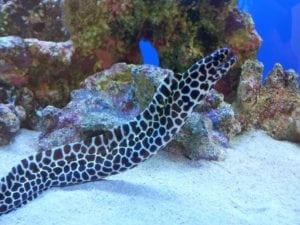Recommendations for Caring for Your Tesselata Moray Eel
By Christeena
- Tesselata Eel: Honeycomb Moray Eel or Leopard Eel – Gymnothorax favagineus
- Care Level: Beginner
- Temperament: Semi-Aggressive to Aggressive
- Diet: Carnivore
- Reef Safe: With Caution
- Max Size: Approx 5’
- Minimum Tank Size: 150 gallons

The Tesselata Moray Eel, part of the Muraenidae family, has a creamy colored body with seductive, dark honeycomb markings. For this reason, the Tesselata Eel is also known as the Honeycomb Moray Eel. These markings even make it look like a leopard, which it is also known as, the Leopard Eel.
Tank Requirements for Tesselata Moray Eel
These eels originated from Sri Lanka and can get quite large. Since they are one of the larger sized eels, it’s best to house them in minimum aquarium size of 150-gallons. Be sure to keep a tight fitting lid on the aquarium, as eels are notorious for their ability to escape. Provide the Tesselata Eel with large anchored, live rock with crevices and passages for shelter. This eel is a nocturnal predator that may remain dormant during the day within the live rock but will consume small fish and invertebrates at night.
Feeding Habits of the Tesselata Moray Eel
Tesselata Moray Eels typically eats live feeder fish, octopus, and squid. It might be necessary to provoke them to eat when they first arrive in the aquarium. Since these eels have poor sight, it is a good idea to use small live fish or even tongs while feeding. The Tesselata Eel is reef safe but will eat smaller fish and cephalopods. Honeycomb Moray is one of the most aggressive Eels available in the industry. Caution should be taken when keeping this fish with other tankmates including other eels. Additionally, take caution when working in the aquarium as they are aggressive and will bite.
Keep Tessalata Eels in a good environment and a temperature between 72 and 78°F. Maintain a pH value of 8.1-8.4, a specific gravity of between 1.020-1.025, and dKH between 8-12.

















